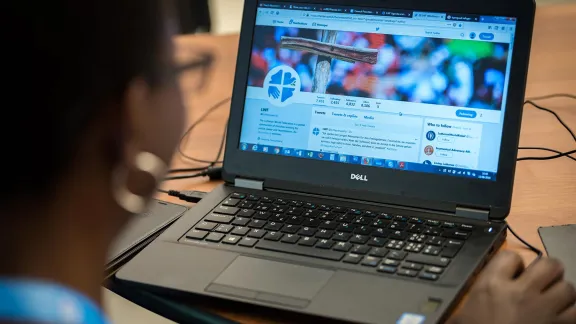
In a webinar, presenters unpack what it means to be church online during the COVID-19 pandemic. Photo: LWF/ AlbinHillert
Webinar discusses ways churches are adapting online
(LWI) - A webinar aimed to inspire churches as they move from offline to online ministry during the Coronavirus disease (COVID-19) pandemic was organized by the Lutheran World Federation (LWF), the World Council of Churches (WCC), the Global Christian Forum (GCF), the World Association for Christian Communication (WACC), the European Christian Internet Conference (ECIC) and other collaborators. It was hosted by the WCC.
Featuring speakers from the Lutheran, Orthodox, Methodist and United Reformed traditions, along with scholars of online religion, the webinar offered insights into worship and ministry during unprecedented times, when churches quickly moved much of their work from face-to-face interactions to online.
The distanced church
Dr Heidi Campbell shared insights from her new book, “The Distanced Church: Reflections on Doing Church Online,” a collection of essays from church leaders and scholars of online religion, reflecting on how churches adapted to and adopted digital technology during the (COVID-19) restrictions.
Campbell, a professor of communications at Texas A&M University and director of the Network of New Media, Religion and Digital Cultural Studies, said the book is an exploration of churches “where members are physically separated from one another due to specific health concerns and safety regulations, yet the church is still called to be a social institution, where people engage, support and care for one another.”
As churches began to appear more online during COVID-19, Campbell said she recognized three themes or approaches to online church, “through transfer, translate or transform strategies.” The themes move from simply recording worship as it was done in the building with a mobile phone or camera running – transfer, to moving worship services into a different environment with leaders speaking from their homes for instance – translate, to experimenting with more interactive technology and methods that allowed for more interaction – transform.
From her research for the book, Campbell said many are rethinking the relationship of church “as just being an embodied experience to being an immediate experience.”
“Hope in an unsecure world”
Even before the COVID-19 lockdown, the Church of Norway had increased its online presence “because we believe we need to be where the people are and the people are online,” said Ingeborg Dybvig, communications director for the Church of Norway in her presentation. During the lockdown, the communications team adopted the strategy of “sharing hope in an unsecure world,” meaning “even though the church doors are closed, the church is open and available.”
This led to high engagement, many resources and online ministries that keep the people connected utilizing Facebook mostly, but also using TikTok and even Minecraft for younger members.
Dybvig said that initially the online communication focused on worship and prayers but then evolved into a variety of programs like online church lunches.
The Church of Norway expects to continue its previous commitment to move into the digital space and “will not move back to how it was before the pandemic,” Dybvig said. “We will find out how we can reach those who are not active in the church and unfold this to the next level.”
Reaching the most vulnerable
In his presentation, Rev. Ralf Peter Reimann, pastor and internet commissioner of the Evangelical Church in the Rhineland, said “the church is local and based in community,” also online. "People found that it wasn’t the quality that was so important but knowing the people and the local community,” Reimann said, adding that the church is no longer reduced to a building, but people coming together in prayer and living their faith.
Rev. Dr Nicolas Kazarian, head of the ecumenical department of the Greek Orthodox Archdiocese of America in New York, emphasized quality and dignity and said that online worship should “represent the liturgical dignity you would expect if you go physically to church.”
Concerns were also raised. “There seems to be some fear of people not coming to offline services, and this is intensified as they can see the sum of offerings decreasing,” Rev.Jonggoo Kim, senior pastor of Seshin Methodist Church in Seoul, South Korea, shared in his presentation.
Lively discussions followed the presentations, addressing questions like how to reach those who are most vulnerable and left out of online spaces and whether these developments will lead a new understanding of digital media and the church. More webinars are planned to continue the discussion.


